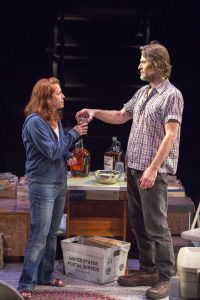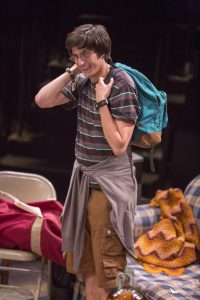The Few Helps Misfits Reach Out in Tender Globe Production
Misfits are always lonesome, even in crowds. But isolate them and things just get worse. Heart-breaking, usually.
The Few, Samuel D. Hunter’s new play now premiering at the Old Globe Theatre, leaves no heart unbroken, onstage or in description. Some may recover, other are already hopeless. But life itself will go on. Just like Samuel Beckett wrote in what’s becoming more and more the key dramatic statement of the last few decades, Waiting for Godot.
Hunter’s few in view are a solemn, lanky, bearded fellow with a vagabond look; a scrappy, belligerent, impatient lass who lives under threat of something; and a flighty, tender boy, urgently groping for virtue and order.
The location is the scruffy office of a publication aimed at an audience of long-haul truck drivers and those who mate with them. The “personal” ads that fill the publication are the desperation calls from all those breaking hearts, most of which have regular account numbers they leave on the answering machine with their latest cri de coeur.
Bryan is one of two who founded the paper in years past, when it was some sort of idealized forum for the exchange of road-wise philosophies and dreams. But he went away when the other guy died in a freeway crash and the paper has been kept alive by the woman, called Q.Z., as a master list for body swaps.Now he’s back from somewhere, wanting something.
There’s a sexual tension in the air, but it’s headed nowhere. Who actually owns the paper? QZ has kept it alive but Bryan has the deed. Is there room for them both? Is the thing even worth saving anymore? The boy Matthew fervently hopes the answer to all these questions is yes. He’s been QZ’s work force for the four years, since she rescued him from a gnarly parent, and he is wrapped in legends of the paper’s original magic. Bryan, to him, is a god returned from the mountain.
It all sorts out, sort of, with comings and goings predictable and otherwise, a couple of surprises and a couple of dark secrets that aren’t that dark. There is a found lyricism about the shape and the sound of the play that is very seductive. Hunter neither wallows in the inarticulate nor follows flights of fancy imagery, choosing instead a strained and harnessed passion that can handle “beatific” as a key word. What’s really endearing about the play is how these tender stories are made to mesh with and illustrate in detail all the other lonely tales being left there on the answering machine. Each could be a novel itself, mostly pulp perhaps but every bit as alive as the stories front and center.
Long-haul truck drivers as the heirs of cowboy legends isn’t a bad use of metaphor to fill a void that always gapes in this vast land. But technology hustles onward. This play, set in 1999, already seems quaint in its dependence on the printed word as middleman. Almost certainly, The Few would now be out of business or surviving only as a vanity-driven blog. And the trucks themselves are increasingly operated with a steely efficiency that has little room for idleness like dreams.
But the theme of the play will remain. And Hunter deserves, for the generosity his sensitive and understanding vision, a production as excellent as the Globe has provided. The casting is exquisite and director Davis McCallum seems that wise and resourceful guide who allows talent to breathe.
As Bryan, Michael Laurence uses an expressive face and body to project simultaneously weariness, apprehension, self-loathing and hopeless despair with a basilisk stare and fearful stillness. Gideon Glick is like a fawn just back from nerd school and Eva Kaminsky dares to render herself asexual in her rage. With McCallum so precisely shaping their construct of Hunter’s words, the play is brilliantly served.
The designers have caught the spirit, too. Dane Laffrey’s set is so woefully without redeeming details that even the Tetris game on the monitor screen looks terminally tacky. Jessica Pabst’s costumes are even further down that road, from the un-chic side of the thrift shop. Matt Frey’s lighting design finds inspiration in fluorescence and Daniel Klugers’ soundtrack may have been drawn entirely from four-track tapes from the $1.98 bin at the truck stop checkout.
Continues on the White Stage at 7 p.m. Tuesdays, Wednesdays and Sundays; 8 p.m. Thursdays-Saturdays; and 2 p.m. Saturdays and Sundays through Oct. 27, 2013.

Welton Jones has been following entertainment and the arts around for years, writing about them. Thirty-five of those years were spent at the UNION-TRIBUNE, the last decade was with SANDIEGO.COM.




